Old Photographs & Drawings of Chester
The
Ermine (now the Flookersbrook)
pub: photographs, reminisciences and some fascinating old advertisments...
In December 1921, Fred Lowe wrote of the hotel its surroundings in the pages of the Cheshire Sheaf: A trades directory for the period immediately before Mr Lowe wrote the above, 1919-20, shows Mr Harold Wilcock as licencee of the Ermine. The origins of The Ermine are doubtlessly very ancient, as it stands squarely upon the Roman Road (some say the road existed long before then) that commenced just outside the Leigonary Fortress of Deva, branching off from Watling Street (Foregate Street) along the line of modern Frodsham Street, Cow Lane Bridge, Brook Street, Flookersbrook, Kilmorey Park Road, the Newton Hollows (a true 'hollow way', worn down by untold centuries of feet, hooves and wheels), Hoole Bank and then onwards to Warrington, the River Mersey and beyond. |
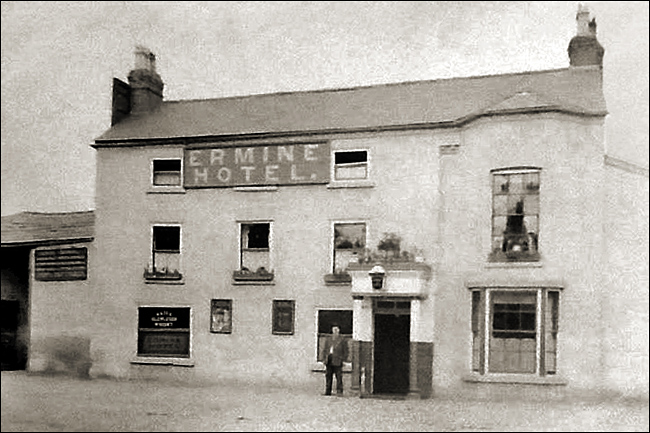
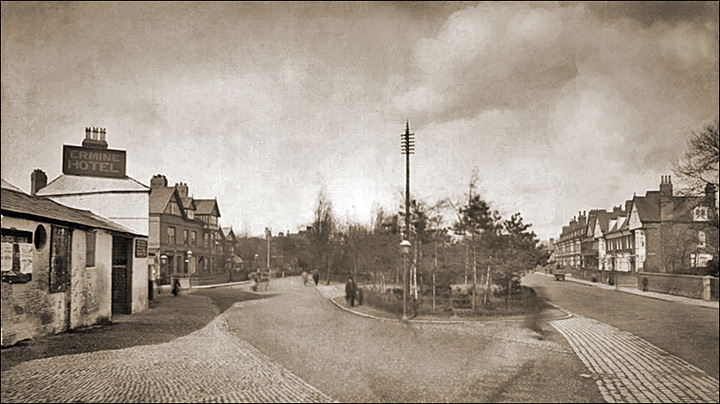
Another rare old view of the Ermine and its surroundings
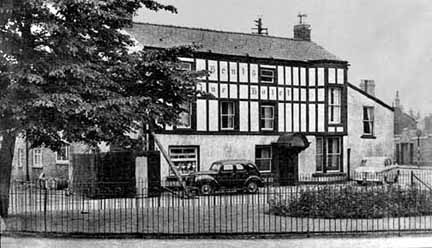
Still the old building but radically altered and looking very different: Bent's Ermine Hotel
around
1955
The Flookersbrook closed down in early February 2013 and was promptly boarded up. The large car showroom next door- Saunders Honda- packed it in around the same time and the entire large plot is, at this time of writing (February 2013), unoccupied and dreadfully scruffy. |
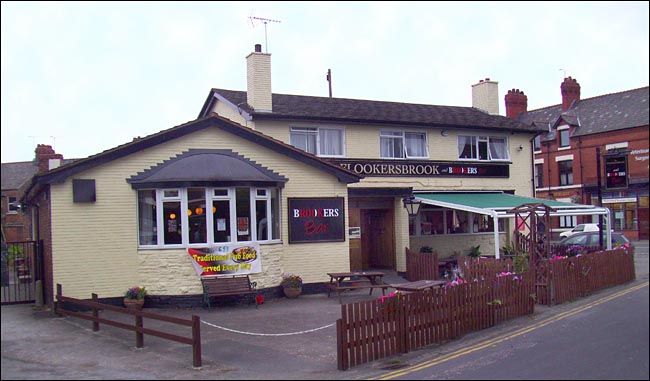
The Flookersbrook: Summer 2010
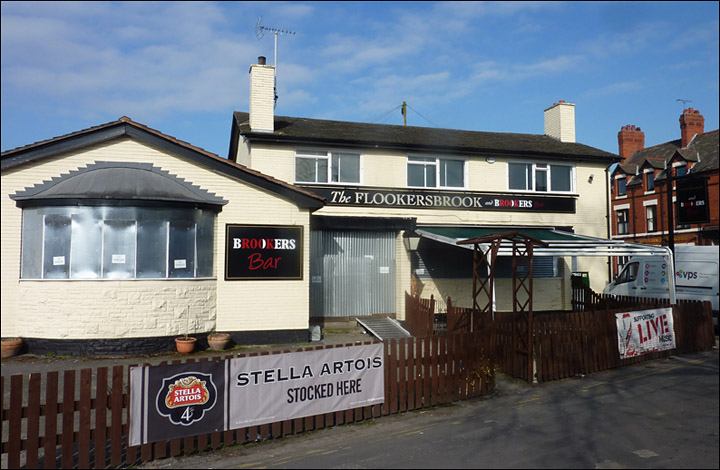
Closed and boarded up in March 2013
An Advertisement from Adams’s Weekly Courant, 18th July 1780:
| MARY ARTINGSTALL, of FLOOKERSBROOK, near this City, Begs leave to inform the Friends of her late Husband, John Artingstall, deceased, THAT she intends to continue the PUBLIC BUSINESS, as usual, at the Sign of the Ermine, in Flookersbrook aforesaid; and also to carry on the MAKING of MALT, under the Management of the Person employed by her late Husband, to whose Friends she returns her sincere Thanks; and assures them and the Public in general, that those who will please to favour her with their Commands, shall be served with the above Article upon the best and most reasonable Terms, By their oblig’d and faithful Servant, MARY ARTINGSTALL |
| Half a century later, an unfortunate landlord, one George Hogg, had his household furniture, bar fittings & brewing vessels– not to mention his pigs and potatoes– sold under a sheriff’s execution. The sale was advertised in the Chester Chronicle on the 13th April 1832: |
| "Sale at the Ermine Inn, Flookersbrook, Near Chester (Under an Execution from the Sheriff.) TO BE SOLD BY AUCTION, By MR. JOHN BROWN, on Monday next the 16th and Wednesday the 18th April, THE whole of the Household Goods, and Furniture, Brewing Vessels, Stock in the Cellars, &c. &c. the property of Mr. George Hogg; comprising several sets of bedsteads, with moreen and chintz hangings, capital feather beds and bedding, (most of them new within the last twelve months), mahogany chests of drawers, and chamber furniture, parlour carpets, mahogany chairs, dining tables, with D ends, several painted dining tables, eight days clock, a quantity of casks and brewing utensils, also the barr fittings. Likewise, a few barrels of ale, a sow with eight young pigs, and two fat pigs. A number of wood hurdles, a quantity of Potatoes, some horses geers, sacks, tools, a quantity of timber, and a variety of articles. The sale to begin each day at eleven o’clock. Chester, April 10th, 1832". |
| Ten years later, Mr J. D. Jacques, landlord from about 1834, renamed the place The Ermine and Railway Inn- doublessly in honour of that revolutionary new method of transport that had so transformed the environment around his pub. He added a bowling green around the same time. Here is his advertisement in the Chester Chronicle, 22nd April 1842: |
| "ERMINE & RAILWAY INN, Flookersbrook, Chester. J. D. JACQUES takes the present opportunity of returning his grateful acknowledgments to his friends and the public, for their kind patronage and support which he has been favoured with since his commencement; and begs to inform them, that in addition to his old Establishment, he has added a splendid BOWLING GREEN, close adjoining the Chester & Birkenhead, and Chester & Crewe or Grand Junction Railway Stations. He invites his friends to an inspection, where they will meet with every accommodation; choice and good Wines, Spirits, home-brewed Ale, and London Porter of first-rate quality. Saddle Horses, neat Gigs, Cars, Phætons, and Chaises, on the shortest notice, and on reasonable terms". |
In February 2010, reader Andy Bruce wrote to tell us, "During the war my dad spent a short time at the old Ermine. He wrote a book of his reminicences and I am sending a bit that is in connection with the Ermine pub. Hope it may be of interest"... Dad went back in the 1970s but the old place had gone. He said that a car showroom is where the yard and outhouses had been. The barman who served them a pint said that when they knocked the old place down they found rooms that hadn't been opened for years, some had even been blocked up. The great great Aunts of mine who ran the pub were spinsters and their surname was Wesson. I don't know wether they held the licence or not. Nettie was married to Sid (who was away soldiering) so perhaps the licence was in his name". In 1818-20 the Ermine's licencee was John Lightfoot (there is a Lightfoot Street just across the road from the pub today), in 1822-3 W Monk, in 1828 Isaac Spedding, in 1840 Isaac David Jacques (who enlarged the place and added the bowling green), later in the 1840s (when it was called The Ermine and Railway Inn: see below) Thomas Chalton, in 1857 C Fern, in 1880 Alexander Kelly and from 1902 to at least 1914 Mr George Barnes and in 1934 Mrs Alice L Wedgwood. |
"Thomas Chalton, Ermine & Railway Inn, Near the Railway Station, Flookersbrook, Chester" Within the flourishes, one can read, "Excellent Beds, Choice Wines, Post Horses, Gigs, Cars, etc." and, of course, "Home Brew'd Ale". The handwritten items are: Bread & Butter |
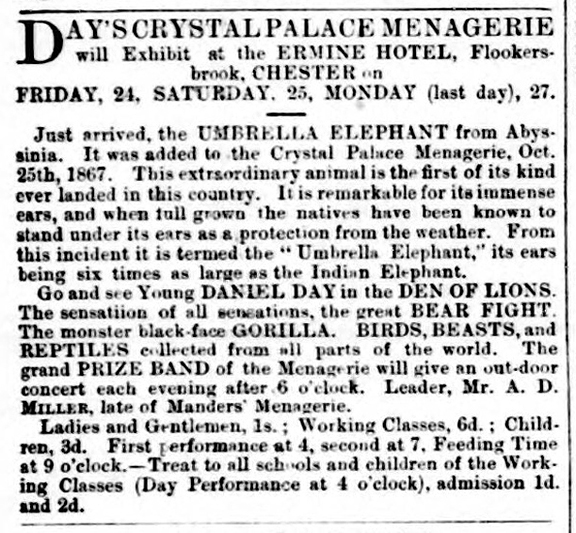
Chester Chronicle: March 1871
Our sincere thanks go to Peter Dyer- a fellow scholar of Chester's lost pubs- for some of the old advertisments.
Chester: a Virtual Stroll Around the Walls | A Virtual Stroll around Hoole | Hoole Business Directory | Old
Pics
of
Liverpool &
Chester
|
B&W
Picture
Place
The Vanished Pubs of Chester | Our lost pubs gallery | Write to Us! | Next Picture- just across the road- the Beehive
Chester: a Virtual Stroll Around the Walls | A Virtual Stroll around Hoole | Hoole Business Directory | Old
Pics
of
Liverpool &
Chester
|
B&W
Picture
Place
The Vanished Pubs of Chester | Our lost pubs gallery | Write to Us! | Next Picture- just across the road- the Beehive
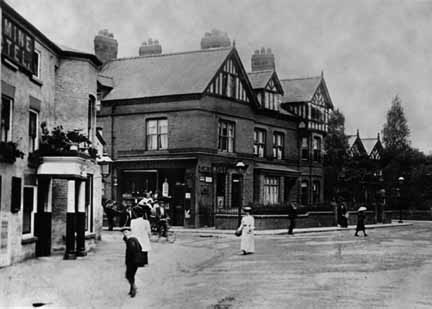 A genteel hotel in a genteel area: the Ermine Hotel photographed around 1910, complete with potted geraniums above the door. On the opposite corner of Ermine Road, Thomas Carter's chemist shop is today the Flookersbrook Veterinary Practice.
A genteel hotel in a genteel area: the Ermine Hotel photographed around 1910, complete with potted geraniums above the door. On the opposite corner of Ermine Road, Thomas Carter's chemist shop is today the Flookersbrook Veterinary Practice. 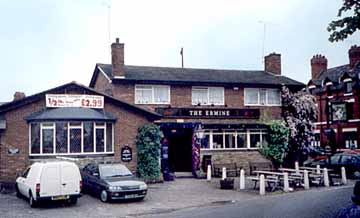 Rebuilt again in the 1960s, here is the Ermine (no longer calling itself a hotel) as it appeared in the summer of 2001. The pub, under this name, closed down in February 2004, only to re-open five months later sporting a startling new paint job, a much smarter image (for a while at least) and a new name, The Flookersbrook, which is the name of the immediate neighbourhood, after an ancient stream which once ran close by.
Rebuilt again in the 1960s, here is the Ermine (no longer calling itself a hotel) as it appeared in the summer of 2001. The pub, under this name, closed down in February 2004, only to re-open five months later sporting a startling new paint job, a much smarter image (for a while at least) and a new name, The Flookersbrook, which is the name of the immediate neighbourhood, after an ancient stream which once ran close by.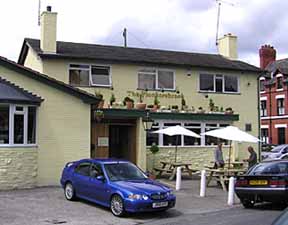 After an encouraging start, however, the decent beer vanished and the place became a 'rock' venue bearing
the alternative signage of 'Brooker's Bar'.
In 2012, the popular
After an encouraging start, however, the decent beer vanished and the place became a 'rock' venue bearing
the alternative signage of 'Brooker's Bar'.
In 2012, the popular 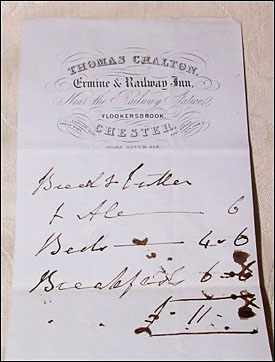 In August 2102, an interesting item appeared on eBay. Its seller, Carol Franzosa in the USA wrote to us, "Hi there. I found your info on the above inn on the web. This is a circa 1840s receipt for The Ermine & Railway Inn with Thomas Chalton as proprietor. Thought you might be interested".
In August 2102, an interesting item appeared on eBay. Its seller, Carol Franzosa in the USA wrote to us, "Hi there. I found your info on the above inn on the web. This is a circa 1840s receipt for The Ermine & Railway Inn with Thomas Chalton as proprietor. Thought you might be interested".